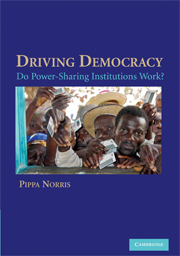Book contents
- Frontmatter
- Contents
- List of Tables
- List of Figures
- Preface and Acknowledgments
- PART I DO POWER-SHARING REGIMES WORK?
- PART II THE IMPACT OF POWER-SHARING INSTITUTIONS
- 5 Electoral Systems
- 6 Presidential and Parliamentary Executives
- 7 Federalism and Decentralization
- 8 The Fourth Estate
- PART III CONCLUSIONS
- Technical Appendix: Description of the Variables and Data Sources
- Notes
- Select Bibliography
- Index
5 - Electoral Systems
Published online by Cambridge University Press: 05 September 2012
- Frontmatter
- Contents
- List of Tables
- List of Figures
- Preface and Acknowledgments
- PART I DO POWER-SHARING REGIMES WORK?
- PART II THE IMPACT OF POWER-SHARING INSTITUTIONS
- 5 Electoral Systems
- 6 Presidential and Parliamentary Executives
- 7 Federalism and Decentralization
- 8 The Fourth Estate
- PART III CONCLUSIONS
- Technical Appendix: Description of the Variables and Data Sources
- Notes
- Select Bibliography
- Index
Summary
Electoral rules represent perhaps the most powerful of the instruments which undergird power-sharing arrangements, with potentially far-reaching consequences for party competition, the inclusiveness of legislatures, and the composition of governments, all of which can influence processes of democratic consolidation. Formal electoral rules are understood in this study, somewhat more broadly than is common in the literature, as the official policies, legal regulations, and administrative procedures governing all steps in the sequential process of contesting elections, casting ballots, and winning elected office. Among these, most attention has conventionally focused upon the last step in the development, including the quota formula, the ballot structure, and the district magnitude, which determine how votes are cast and then converted into elected office.
The theory of consociationalism argues that power-sharing arrangements have important consequences for ‘kinder, gentler’ governance. Rules which recognize and seek to accommodate parties and representatives drawn from distinct ethnic groups are thought most likely to consolidate fragile democracies by facilitating accommodation and building trust among diverse communities living in deeply divided societies. The electoral mechanisms most closely associated with power-sharing include proportional representation systems, which lower the barriers facing smaller parties, and positive action strategies, such as reserved seats for ethnic communities and minority-majority constituencies. Power-sharing electoral institutions are thought especially important for accommodating diverse groups, reducing community tensions, and promoting acceptance of peace-settlements in fragmented societies emerging from a recent history of bloody civil war and regime instability.
- Type
- Chapter
- Information
- Driving DemocracyDo Power-Sharing Institutions Work?, pp. 103 - 131Publisher: Cambridge University PressPrint publication year: 2008
- 1
- Cited by

